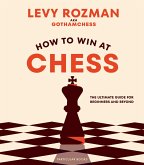By the authors of the national bestseller Wittgenstein's Poker, a riveting account of the legendary 1972 chess match between Boris Spassky, the world champion from the Soviet Union, and the American challenger Bobby Fischer In the summer of 1972, with a presidential crisis stirring in the United States and the cold war at a pivotal point, the Soviet world chess champion Boris Spassky and his American challenger Bobby Fischer met in Reykjavik, Iceland for a chess match that held the world spellbound for two months with reports of psychological warfare, political intrigue, and cliffhangers. Thirty years later, David Edmonds and John Eidinow have set out to reexamine the story we recollect as the quintessential cold war clash between a lone American star and the Soviet chess machine. A mesmerizing narrative of hubris and despair, Bobby Fischer Goes to War is a biting deconstruction of the Bobby Fischer myth, a nuanced study on the art of brinkmanship, and a revelatory cold war tragicomedy.








